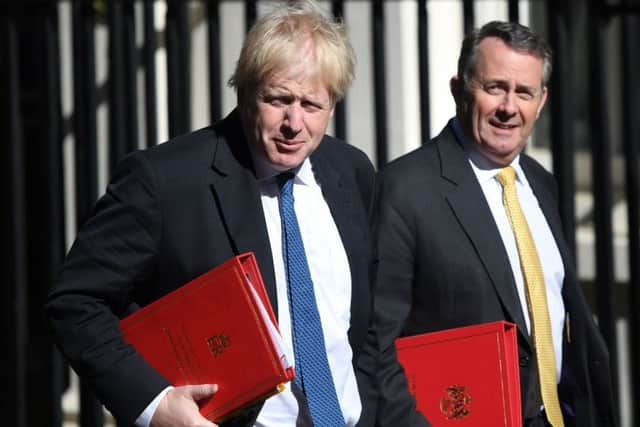Final attempt to reach post-Brexit deal on devolution set to fail
The outcome means the Scottish Parliament looks increasingly certain to withhold its support for the EU Withdrawal Bill later this month in a constitutional flashpoint ministers from both governments have worked for months to avoid.
Peers will debate a series of amendments to the EU Withdrawal Bill this evening that would require the UK government to get the consent of MSPs before retaining any devolved powers returning from Brussels at Westminster.
Advertisement
Hide AdAdvertisement
Hide AdScottish Government Brexit minister Michael Russell will also be in London for a final round of talks before clause 11 of the EU Withdrawal Bill, which deals with post-Brexit powers, is amended by peers.


Mr Russell claimed a deal “can still be reached” if UK ministers accepted the amendments, which would give Holyrood an effective veto over whether new powers in areas including agriculture, fisheries and the environment are “frozen” at Westminster for a period of up to seven years. However, none of the changes put forward by peers acting on the SNP’s behalf are expected to be put to a vote and are likely to be withdrawn following debate.
It is also understood that Labour peers will not oppose the UK government’s amendments to clause 11 despite Scottish Labour leader Richard Leonard saying on Monday “there are still knots in the bill … that need to be untied”.
None of the substantive proposals to break the deadlock are thought to be acceptable to the UK government, which says it cannot give Scotland a veto over key powers that govern trade within the UK and with other countries.
Amendments put forward by crossbench peer Lord Hope of Craighead and Conservative peer Baron Mackay of Clashfern would require agreement from all devolved nations before any powers are retained at Westminster, on the same legal basis as the Edinburgh Agreement that set the terms for the 2014 Scottish independence referendum.
Ahead of today’s meeting, Mr Russell said: “The UK government’s proposals would mean Westminster having free rein to tie the Scottish Parliament’s hands for up to seven years – without its consent – on key devolved policies.
“The UK government is demanding we sign up to a bizarre proposal that would allow them to treat a straight refusal of the Scottish Parliament to consent to changes in devolved powers as a green light to go ahead and change them anyway.
“An agreement can, however, still be reached. Either remove clause 11 completely, so that there is equity between the Scottish Parliament and Westminster, or the UK government could accept the amendments tabled in the House of Lords by Lord Hope and Lord Mackay so that the present system is continued, where any regulations altering the powers of the Scottish Parliament can only be made when that is agreed by the Parliament.”
Advertisement
Hide AdAdvertisement
Hide AdBut UK Cabinet Office minister David Lidington said the EU Withdrawal Bill had already been “changed significantly”. He said talks must now focus on how the 24 contested powers would be managed, not whether the Scottish Parliament would be asked for permission before they were held at Westminster.
Mr Lidington said: “Regardless of what course the Scottish Government chooses, there is an important programme of work requiring our immediate attention on UK frameworks and the wider EU negotiations, where we must continue to work together to make sure that all parts of the UK are ready for when we leave the EU.”
Attention will now turn to the Supreme Court, where a Continuity Bill passed by MSPs that asserts Holyrood’s authority over contested powers is set to be examined by judges.
One opposition amendment that could be voted on by peers calls for any “freeze” on devolved powers at Westminster to be cut from a maximum of seven years to five.
The proposer of the amendment, Liberal Democrat peer Lord Wallace, said the UK government had “failed to provide a rationale for why restrictions on devolved powers should last for seven years”.